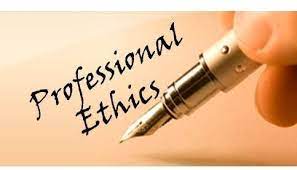
Ethics in professional development is a cornerstone of a thriving and sustainable work environment. As individuals advance in their careers, maintaining ethical standards becomes paramount. This involves upholding honesty, integrity, and transparency in all professional dealings. Ethical behavior extends to respecting the rights and dignity of colleagues, clients, and stakeholders. It includes a commitment to continuous learning and staying updated on industry best practices. Professional development must prioritize fairness, diversity, and inclusivity, ensuring equal opportunities for all. Upholding ethical principles fosters trust among team members and enhances the reputation of individuals and organizations alike, contributing to a positive and ethically sound professional community.
Professional ethics development is a crucial aspect that shapes the character and conduct of individuals within various fields. As we navigate an increasingly complex and interconnected world, the significance of ethical behavior in professional settings becomes more pronounced. Ethics goes beyond mere compliance with rules and regulations; it involves making morally sound decisions that contribute to the overall well-being of society. This essay explores the multifaceted importance of ethics in professional development, examining its impact on individuals, organizations, and the broader community.
Individual Growth and Integrity:
At the core of professional development is the growth of individuals, both personally and within their chosen careers. Ethics serves as a guiding principle for individuals, providing a moral compass that influences decision-making and behavior. Upholding ethical standards fosters a sense of integrity, creating a foundation for trust and credibility. When professionals act with honesty, transparency, and a commitment to moral principles, they not only enhance their personal reputation but also contribute to the overall positive perception of their chosen field.
Professionalism and Organizational Culture:
Ethics plays a pivotal role in shaping the culture of organizations. A strong ethical framework promotes a culture of professionalism, where employees are expected to conduct themselves with integrity and adhere to established ethical standards. Organizations that prioritize ethics in their development create an environment conducive to innovation, collaboration, and employee satisfaction. Moreover, an ethical organizational culture attracts top talent and cultivates a positive reputation, resulting in increased credibility and stakeholder trust.
Trust and Stakeholder Relationships:
Trust is a foundational element in any professional relationship, be it between colleagues, clients, or stakeholders. Ethics acts as a catalyst for building and maintaining trust. Professionals who consistently demonstrate ethical behavior instill confidence in their stakeholders, leading to stronger and more sustainable relationships. Trust is a fragile asset, easily damaged by unethical conduct, and the erosion of trust can have far-reaching consequences for both individuals and organizations.
Social Responsibility and Impact:
Ethics extends beyond individual and organizational boundaries, encompassing a broader social responsibility. Professionals, as contributors to society, have an ethical obligation to consider the impact of their decisions on the well-being of the community at large. Ethical behavior in professional development involves not only compliance with laws and regulations but also a commitment to social justice, environmental sustainability, and the overall betterment of society. Professionals who embrace their social responsibility contribute to the creation of a more just and sustainable world.
Legal Compliance and Risk Mitigation:
Ethics and legal compliance are interconnected but distinct concepts. While laws provide a framework for acceptable behavior, ethics delves into the moral reasoning behind those behaviors. Professionals must not only comply with existing laws but also strive to exceed minimum legal requirements by upholding ethical standards. This proactive approach not only mitigates legal risks but also helps prevent potential harm to individuals, organizations, and society as a whole.
Continuous Learning and Adaptability:
In a rapidly changing professional landscape, ethical considerations become even more critical. Professionals must be adaptable and continuously learn to navigate new challenges and complexities. Ethics serves as a constant guide, enabling individuals to make informed decisions in the face of evolving circumstances. A commitment to ethical behavior fosters a mindset of lifelong learning and adaptability, contributing to sustained professional development.
Conclusion:
In conclusion, the importance of ethics in professional development cannot be overstated. It is a fundamental element that shapes the character of individuals, defines the culture of organizations, builds trust in relationships, fulfills social responsibilities, and ensures legal compliance. As professionals strive for growth and excellence in their careers, they must recognize that ethical conduct is not just a requirement but a cornerstone for building a successful, sustainable, and socially responsible professional life. Embracing ethics in professional development is not only a personal choice but a collective responsibility that contributes to the betterment of individuals, organizations, and society as a whole.










